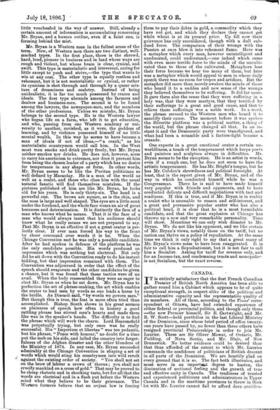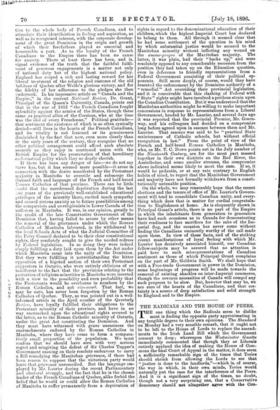CANADA.
IT is entirely satisfactory that the first French Canadian Premier of British North America has been able to gather round him a Cabinet which appears to be of quite exceptional strength, in respect alike of the political and administrative capacity and the representative quality of its members. All of them, according to the Times' corre- spondent at Ottawa, have had extended experience of either federal or provincial politics, and though only three —the new Premier himself, Sir R. Cartwright, and Mr. R. W. Scott—held portfolios in the last Liberal Ministry of the Dominion, since whose brief period of office twenty- one years have passed by, no fewer than three others have resigned provincial Premierships in order to join Mr.. Laurier. These are Sir Oliver Mowat, of Ontario, Mr. Fielding, of Nova Scotia, and Mr. Blair, of New Brunswick. No better evidence could be desired than that thus afforded of the extent to which Mr. Laurier commands the confidence of politicians of British descent in all parts of the Dominion. We are heartily glad on every ground that it is so. The fact both illustrates, and must serve in an importasit degree to hasten, the diminution of sectional feeling and the growth of true and effective unity in Canada. The readiness of trusted and experienced politicians and administrators in Upper Canada and in the maritime provinces to throw in their lot with Mr. Laurier cannot fail to afford deep gratifica. Lion to the whole body of French Canadians, and to stimulate their identification in feeling and aspiration, as well as in recognised interest, with the corporate develop- ment of the great Dominion in the origin and growth of which their forefathers played so essential and honourable a part. As to the loyalty of the French Canadians to the Empire there has been no cause for anxiety. There at least there has been, and is, signal evidence of the truth that the faithful fulfil- ment of generous engagements is a matter not only of national duty but of the highest national policy. England has reaped a rich and lasting reward for her liberal treatment of the religion and customs of the old labitans of Quebec after Wolfe's glorious victory, and for the fidelity of her adherence to the pledges she then undertook. In his impressive article on "Canada and the Empire," in the current National Review, Dr. Grant, Principal of the Queen's University, Canada, points out that in the war of 1812 "the French Canadians fought splendidly against the armies of the States, though these came as practical allies of the Corsican, who at the time was the idol of every Frenchman." Political gratitude— that sentiment the existence of which is so often cynically denied—still lives in the hearts of the French Canadians, and its vitality is not lessened or its genuineness diminished by the fact that now, even more clearly than in the early years of the century, they recognise that no other political arrangement could afford such absolute security as they enjoy in continued union with the British Empire for the preservation of that hereditary ecclesiastical polity which they so dearly cherish.
If there has been any danger of late—we do not say there has, but it has seemed more possible—it arose in connection with the desire manifested by the Protestant majority in Manitoba to override and submerge the .listinct faith and language of the French and half-breed 11Zoinan Catholics of that province. There can be little .:oubt that the unredressed deprivation during the last :ive years of the previously well-established educational privileges of the minority there, excited much sympathy and caused serious anxiety as to future possibilities among the compatriots and co-religionists in Lower Canada of the sufferers in Manitoba. It was, in our opinion, greatly to the credit of the late Conservative Government of the Dominion that, having failed to secure by other means the removal of the grievances under which the Roman Catholics of Manitoba laboured, in the withdrawal by the local Schools Acts of what the Judicial Committee of the Privy Council declared to be their clear constitutional rights, they resolutely sought to give the needed redress by Federal legislation. In so doing they were indeed simply fulfilling a duty laid upon them by the Act under which Manitoba came into the unity of the Dominion. But they were fulfilling it notwithstanding the bitter opposition of a bigoted section of their own Protestant supporters in Ontario, who were entirely oblivious of or indifferent to the fact that the provisions relating to the protection of religions minorities in Manitoba were inserted with a view to the possibility and even probability that the Protestants would be overborne in numbers by the r Roman Catholics, and not vice-versd. That fact, we may be sure, has never been forgotten by the Roman g Catholics of Quebec. They, as was pointed out in a well- informed article in the April number of the Quarterly Review, have loyally fulfilled their obligations to the Protestant minority of their province, and have in no way encroached upon the educational rights secured to the latter, as to the Roman Catholic minority of Ontario, under the great Act constituting the Dominion. And they must have witnessed with grave uneasiness the encroachments endured by the Roman Catholics in Manitoba, where they have c.ome to form a compara- tively small proportion of the population. We must confess that we should have seen with very serious regret and misgiving the defeat of Sir Charles Tupper's Government ensuing on'their resolute endeavour to carry a Bill remedying the Manitoban grievance, if there had been reason to suppose that the victorious party would leave that grievance unremedied. But the language em- ployed by Mr. Laurier during the recent Parliamentary and electoral struggle, and the fact that he is the chosen leader of the French Canadians of Quebec, alike forbid the belief that he would or could allow the Roman Catholics of Manitoba to suffer permanently from a deprivation of rights in regard to the denominational education of their children, which the highest Imperial Court has declared to belong to them. All through it seemed clear that he had some settlement of the question in his mind by which substantial justice would be secured to the Manitoban minority without inflicting any wound on the amour-propre of the Manitoban majority. The latter, it was plain, had their "backs up," and were resolutely opposed to any considerable recession from the position they had taken up on the Education question, even in deference to friendly representations from a Federal Government consisting of their political op- ponents. Still more deeply, of course, would they have resented the enforcement by the Dominion authority of a " remedial " Act overriding their provincial legislation, and it is conceivable that this clashing of Federal with "State" rights might have involved a perilous strain upon the Canadian Constitution. But it was understood that the Manitoban authorities might be willing to make important concessions in response to representations from a Liberal Government, headed by Mr. Laurier, and several days ago it was reported that the provincial Premier, Mr. Green- way, and his colleagues had decided on a compromise long before agreed upon in essence between them and Mr. Laurier. That essence was said to be "practical State maintenance of Catholic schools, but without official recognition in law." From the point of view of the French and half-breed Roman Catholics in Manitoba, who, as Mr. T. C. Down points out in the July number of the Nineteenth Century, are for the most part massed together in their own districts on the Red River, the Assiniboine, and some smaller streams, the compromise above indicated seems likely to meet the case. If so, it would be pedantic, or at any rate contrary to English habits of mind, to regret that the Manitoban Government and majority have not formally withdrawn from a consti- tutionally untenable position.
On the whole, we may reasonably hope that the recent elections and the tenure of office of Mr. Laurier's Govern- ment will tend to consolidate Canadian unity, and every- thing which does that is matter for cordial congratula- tion to Englishmen at home. As is eloquently shown in Principal Grant's article, there is no part of the Empire in which the inhabitants from generation to generation have had such occasions as in Canada for demonstrating their readiness to face sacrifices for the sake of the Im- perial flag, and the occasion has never come without finding the Canadians eminently worthy of the call made upon them. In view of these facts, and of the striking recent manifestations of loyal feeling with which Mr. Laurier has decisively associated himself, our Canadian fellow-subjects may be assured that no attention is paid here to such misrepresentations of Canadian sentiment as those of which Principal Grant complains on the part of Mr. Goldwin Smith. We shall hope that with a Free-trade Government in power in the Dominion, some beginnings of progress will be made towards the removal of existing shackles on inter-Imperial commerce, though the revenue necessities of Canada will compel any such progress to be slow. But, however that may be, we are sure of the hearts of the Canadians, and that cer- tainty is a source of deep satisfaction and solid strength to England and to the Empire.



































 Previous page
Previous page